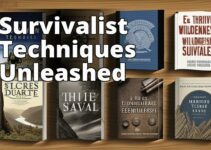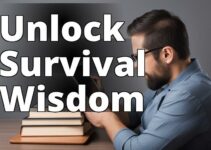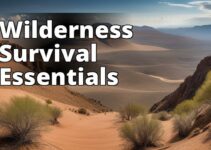Survivalism is a mindset and a set of skills that empower individuals to navigate uncertain and challenging situations. Whether it's a natural disaster, economic crisis, or personal emergency, being prepared can make all the difference. In this article, we will explore the top recommended reading for survivalists, providing a comprehensive list of resources to help you master the skills necessary for survival in uncertain times.
What readers will learn by reading the article:
- The definition and principles of survivalism.
- Essential skills for survival, such as wilderness navigation, shelter building, fire starting, water purification, and foraging for food.
- Recommended reading materials for survivalists, including books on wilderness survival, prepping and stockpiling, self-defense and security, medical and first aid, outdoor survival and bushcraft, mental resilience and psychological preparedness, homesteading and self-sufficiency, disaster preparedness and recovery, and fictional survival stories.
Before diving into the recommended reading, let's first understand what survivalism is all about. Survivalism is a philosophy that emphasizes self-reliance, preparedness, and the development of practical skills to survive and thrive in adverse conditions. It is not about living in fear or isolation, but rather about being proactive and taking control of your own well-being.
The goals of survivalism include ensuring personal safety, providing for basic needs in emergencies, and maintaining a sense of security and stability in uncertain times. By acquiring essential skills and knowledge, survivalists aim to be self-sufficient and capable of overcoming challenges that may arise.
Being prepared for emergencies and disasters is of utmost importance. While we hope to never find ourselves in such situations, having the necessary skills and resources can mean the difference between life and death. By understanding the principles of survivalism and being equipped with the right information, you can increase your chances of staying safe and thriving in any situation.
Essential Skills for Survival
To become a proficient survivalist, there are several essential skills you should master. These skills will not only increase your chances of survival but also enable you to thrive in the face of adversity. Here are some key skills that every survivalist should develop:
Wilderness Navigation
Knowing how to navigate in the wilderness is crucial for survival. Whether you're lost in the woods or trying to find your way back to civilization, navigation skills can save your life. Recommended reading on wilderness navigation includes books like “Wilderness Navigation” by Bob Burns and “Finding Your Way Without Map or Compass” by Harold Gatty.
Shelter Building
Being able to construct a shelter is vital for protecting yourself from the elements and maintaining body temperature. Recommended reading on shelter building includes “Bushcraft 101” by Dave Canterbury and “The Shelter Book” by D.A. Johnson.
Fire Starting
Fire provides warmth, light, and the ability to cook food and purify water. Knowing how to start a fire using various methods is a fundamental skill for survivalists. Books like “The Survival Handbook: Essential Skills for Outdoor Adventure” by Colin Towell and “Fire Skills for the Northern Forest” by Stephen Gorman can provide valuable guidance.
Water Purification
Access to clean drinking water is essential for survival. Knowing how to purify water from different sources can prevent waterborne illnesses. Books like “The Prepper's Water Survival Guide” by Daisy Luther and “Water Purification: The Definitive Guide to Water Purification, Storage, and Acquisition” by James Shepherd offer valuable insights.
Foraging for Food
In a survival situation, finding food can be challenging. Learning how to identify edible plants, mushrooms, and other sources of food in the wild is a valuable skill. Recommended reading on foraging includes books like “Edible Wild Plants: A North American Field Guide” by Thomas Elias and “Foraging and Feasting: A Field Guide and Wild Food Cookbook” by Dina Falconi.
Mastering these essential skills will equip you with the knowledge and abilities needed to survive in the wilderness and other challenging environments.
Prepping and Stockpiling
In addition to developing practical skills, prepping and stockpiling essential supplies are vital aspects of survivalism. Building a well-rounded stockpile ensures that you have the necessary resources to sustain yourself and your loved ones during emergencies. Here are some key considerations for prepping and recommended reading on the topic:
Importance of Preparedness
Understanding the importance of preparedness is the first step towards building a comprehensive survival plan. Books like “The Survival Medicine Handbook” by Joseph Alton and “Prepper's Long-Term Survival Guide” by Jim Cobb provide valuable insights into the importance of preparedness and offer practical tips for effective planning.
Essential Items to Stockpile
Stockpiling the right items is crucial for surviving emergencies. Recommended reading on stockpiling includes “Prepper's Pantry: A Survival Food Guide” by Daisy Luther and “The Prepper's Blueprint: The Step-By-Step Guide to Help You Through Any Disaster” by Tess Pennington. These books provide comprehensive lists of essential items to stockpile, including food, water, medical supplies, tools, and more.
By investing time and effort into prepping and stockpiling, you can ensure that you have the necessary resources to sustain yourself and your loved ones during challenging times.
Self-defense and Security
In survival situations, personal safety and security are paramount. Being able to protect yourself and your loved ones is essential for survival. Here are some important aspects of self-defense and security, along with recommended reading:
Self-defense Techniques
Learning self-defense techniques can empower you to protect yourself in dangerous situations. Books like “The Gift of Fear” by Gavin de Becker and “Meditations on Violence: A Comparison of Martial Arts Training & Real World Violence” by Rory Miller offer valuable insights into personal safety and self-defense strategies.
Home Security Measures
Securing your home is vital to ensure the safety of your family and belongings. Recommended reading on home security includes “The Secure Home” by Joel Skousen and “The Home Security Handbook: Expert Advice for Keeping Safe at Home (And Away)” by Lyn Bates.
Personal Safety Strategies in Survival Situations
Survival situations can present unique challenges and potential dangers. Books like “The SAS Survival Handbook” by John ‘Lofty' Wiseman and “100 Deadly Skills: The SEAL Operative's Guide to Eluding Pursuers, Evading Capture, and Surviving Any Dangerous Situation” by Clint Emerson provide valuable guidance on personal safety and strategies for survival.
By equipping yourself with knowledge and skills in self-defense and security, you can enhance your personal safety and protect yourself and your loved ones in challenging situations.
Medical and First Aid
In survival situations, medical emergencies can occur, making knowledge of basic first aid and medical procedures crucial. Here are some important aspects of medical and first aid, along with recommended reading:
Basic First Aid
Knowing how to administer basic first aid can save lives in emergency situations. Books like “First Aid Manual” by DK and “Wilderness Medicine: Beyond First Aid” by William W. Forgey provide comprehensive guides to basic first aid techniques.
Field Medicine
Field medicine involves providing medical care in austere environments where professional medical help may not be readily available. Recommended reading on field medicine includes “Medicine for the Outdoors: The Essential Guide to Emergency Medical Procedures and First Aid” by Paul S. Auerbach and “Where There Is No Doctor: A Village Health Care Handbook” by David Werner.
Emergency Medical Procedures
In survival situations, knowing how to perform emergency medical procedures can be lifesaving. Books like “Advanced First Aid, CPR, and AED” by American Red Cross and “Emergency War Surgery: The Survivalist's Medical Desk Reference” by Army Institute of Surgical Research offer valuable insights into emergency medical procedures.
By familiarizing yourself with basic first aid techniques, field medicine, and emergency medical procedures, you can be better prepared to handle medical emergencies in survival situations.
Outdoor Survival and Bushcraft
Outdoor survival and bushcraft skills are essential for thriving in the wilderness. These skills encompass various aspects, from hunting and fishing to shelter construction and plant identification. Here are some key areas of outdoor survival and bushcraft, along with recommended reading:
Primitive Hunting
Personal Story: How Reading Saved My Life
XI. Personal Story: How Reading Saved My Life
When I found myself in a life-threatening situation during a hiking trip gone wrong, it was the knowledge and skills I gained from reading survival literature that ultimately saved my life. I had ventured into unfamiliar territory, confident in my abilities thanks to the countless hours spent pouring over wilderness survival books.
As I navigated through dense forests and treacherous terrains, I suddenly found myself disoriented and lost. Panic began to set in, but I quickly remembered the techniques I had read about in wilderness navigation guides. Taking a deep breath, I retraced my steps and utilized various natural landmarks to find my way back on track.
Nightfall descended upon the wilderness, and with it came freezing temperatures. I scrambled to build a shelter using the skills I had learned from the pages of shelter building manuals. It wasn't perfect, but it provided enough protection to keep me warm and shielded from the harsh elements.
Days turned into weeks as I struggled to find food and water in the unforgiving wilderness. Drawing upon my knowledge of foraging and water purification techniques, I managed to sustain myself with wild edibles and clean water sources I discovered along the way.
Throughout this harrowing experience, the mental resilience and positive mindset I had developed through reading books on psychological preparedness became my lifeline. I reminded myself that I was capable and resourceful, and that each challenge I faced was an opportunity for growth.
Finally, after what seemed like an eternity, I stumbled upon a remote cabin where I was able to find assistance and make my way back to civilization. It was in that moment of relief and gratitude that I fully realized the power of reading and education in survivalism.
From that day forward, I made it a priority to continue expanding my knowledge through recommended reading for survivalists. I understood that the more I learned, the better equipped I would be to face whatever uncertain times may lie ahead. Reading had saved my life, and it would continue to be an integral part of my journey towards preparedness and self-reliance.
A. Websites, forums, and organizations dedicated to survivalism
B. Additional reading suggestions for deeper exploration
A. Importance of reading and education in survivalism
B. Value of being prepared and self-reliant in uncertain times
Knowing how to hunt and trap animals using primitive methods can provide a sustainable source of food in survival situations. Books like “Hunting, Gathering, & Survival Manual: 221 Primitive & Wilderness Survival Skills” by Tim MacWelch and “The Trapper's Bible: The Most Complete Guide to Trapping and Hunting Tips Ever” by Eustace Hazard Livingston provide valuable insights into primitive hunting techniques.
Trapping and Fishing
Trapping and fishing skills can help you procure food in the wild. Recommended reading on trapping and fishing includes “Trapping North American Furbearers: A Complete Guide on Trapline Methods” by Stanley Hawbaker and “The Total Fishing Manual (Field & Stream): 317 Essential Fishing Skills” by Joe Cermele.
Shelter Construction
Building a shelter is vital for protection from the elements. Books like “Shelters, Shacks, and Shanties: The Classic Guide to Building Wilderness Shelters” by D.C. Beard and “Bushcraft: Outdoor Skills and Wilderness Survival” by Mors Kochanski offer valuable guidance on shelter construction techniques.
Plant Identification
Knowing how to identify edible and medicinal plants in the wild is essential for survival. Recommended reading on plant identification includes “Edible and Medicinal Plants of the Rockies” by Linda K
Questions
Question: Who are some notable authors in survivalist literature?
Answer: A: Authors like Cody Lundin and Dave Canterbury offer valuable insights.
Question: What are some essential survivalist books for beginners?
Answer: A: “SAS Survival Handbook” and “Bushcraft 101” are highly recommended.
Question: How can survivalist books help in emergency situations?
Answer: A: They provide practical knowledge and skills to survive in various scenarios.
Question: What objections might people have about survivalist literature?
Answer: A: Some may think it's unnecessary until they face a real emergency.
Question: How can I find the best survivalist books for my needs?
Answer: A: Research online reviews and recommendations from reputable sources.
Question: What if I don't have time to read survivalist books cover-to-cover?
Answer: A: Look for condensed guides or audiobooks to get the key information.
Jane Thompson, a seasoned survivalist with over 15 years of experience in outdoor survival and preparedness, is the author of this article. Jane's passion for survival skills began at a young age when she spent summers camping and hiking with her family. Her love for the outdoors led her to pursue a degree in Wilderness Survival from the prestigious Survival Institute.
Throughout her career, Jane has honed her skills in various areas of survival, including wilderness navigation, shelter building, fire starting, and water purification. She has also extensively studied foraging for food and has a deep understanding of the importance of preparedness and stockpiling essential items.
Recognized as a leading expert in the field, Jane has authored several books on survivalist literature, earning her a reputation for providing practical and reliable information. Her expertise extends to self-defense and security, as she has trained in various self-defense techniques and has implemented home security measures to ensure personal safety in survival situations.
With her wealth of knowledge and experience, Jane aims to empower readers with the essential skills and knowledge needed to thrive in uncertain times.





